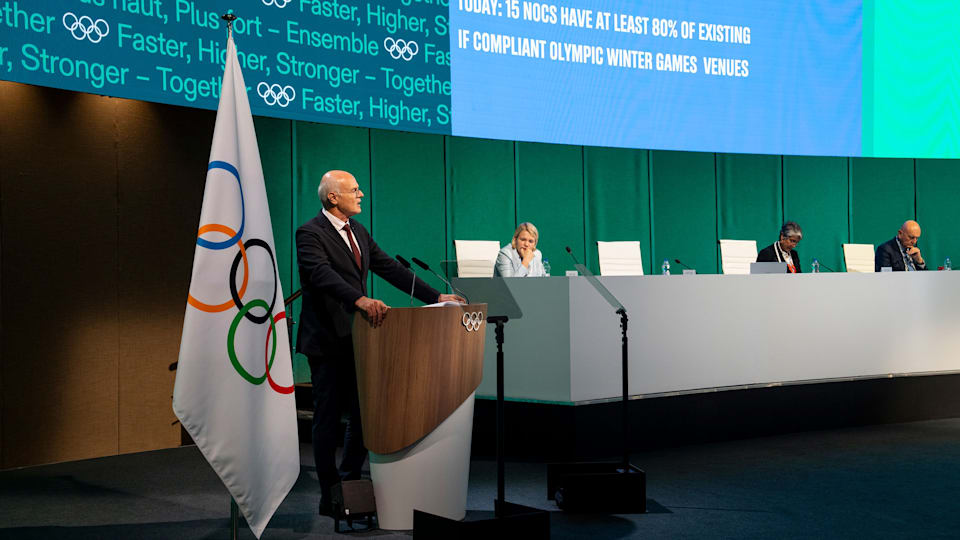IOC Session approves principle of 2030-2034 double allocation for Olympic Winter Games
The 141st International Olympic Committee (IOC) Session in Mumbai, India, today approved the principle of a double allocation for the Olympic Winter Games in 2030 and in 2034 by the IOC Session in 2024, should the appropriate conditions exist.

The proposal was presented on Friday to the IOC Executive Board (EB) in Mumbai by the Chair of the IOC’s Future Host Commission for the Olympic Winter Games, Karl Stoss. It was supported by the presidents of all seven Olympic Winter Sports International Federations (IFs), and was unanimously approved by the IOC Session.
The proposal was made in order to allow more time for the Olympic Movement to address the challenges made clear by the preliminary findings of a report looking at the impact of climate change on the Olympic Winter Games, which was also presented to the IOC EB on Friday. It reveals a reduction in the pool of potential hosts by 2040, and further by mid-century.
This will require deliberations on a potential rotation, the composition of the programme, the different needs for sports on ice and snow, and many other elements.
Discussions about a sustainable economic model for the Olympic Winter Games are also ongoing, after another study by the Commission showing that the costs of organising sports events at the Games are substantially higher than the combined costs of equivalent World Championships.
The Future Host Commission believes that the organisation of Olympic Winter events needs to be based on World Championship service levels, experience and budgets, while keeping the must-have elements to preserve the uniqueness of the Olympic Games.
Commission Chair Karl Stoss said: “Whilst we look forward to celebrating 100 years of the Olympic Winter Games next February, there is no doubt that we are facing great challenges, and our goal is to ensure we can continue to hold successful Games in the future.
“A double allocation would bring security for the Olympic Movement in solid traditional winter sport and climate-reliable hosts until 2034, while allowing the IOC time to reflect on the long-term future of the Winter Games.”
Current interest in Winter and Summer Games
There are three countries or regions, together with their National Olympic Committees (NOCs), interested in the Olympic Winter Games 2030 that are currently finalising their feasibility studies: France, Sweden and Switzerland. Salt Lake City has expressed a preference for the Olympic Winter Games 2034 but is available for 2030, if needed.
The Future Host Commission is conducting its own feasibility study on each Interested Party, to be discussed during the Commission’s meeting in November.
Should the Commission feel that it is in a position to do so, it will recommend the opening of a Targeted Dialogue to the IOC EB at its meeting in November, with a view to an IOC Session election in 2024.
The Chair of the Future Host Commission for the Games of the Olympiad, Kolinda Grabar-Kitarović, also reported that the number of Interested Parties for hosting the Olympic Games is in double digits, and that there is a healthy pipeline of interest in the Youth Olympic Games.
This is a result of the IOC’s new approach to electing hosts, which is helping potential hosts to align their projects with their long-term regional and national ambitions and work towards achieving the United Nations Sustainable Development Goals.
It is also helping potential hosts to save costs. Audited accounts have shown that Brisbane 2032 spent 80 per cent less in Continuous and Targeted Dialogue than the average spent by Candidate Cities for the Olympic Games in 2020, 2024 and 2028.
Mrs Grabar-Kitarović said: “To see such great interest in hosting Olympic Games, led by National Olympic Committees, is very encouraging.”
She also noted the current challenges: “With the growing politicisation of sport across the world, the universality of the Olympic Games must remain a guiding principle in the election of Olympic hosts. We have witnessed more and more government restrictions being placed on athletes’ access to international sporting competitions, including governments prohibiting athletes from participating in international competitions in their country for political reasons. The Future Host Commission must take any infringement of the Olympic Charter into consideration at all stages of the dialogue.”
Games optimisation
A key component of ensuring a sustainable future for the Olympic Games and the Olympic Winter Games is the IOC’s Games Optimisation Group, which was established in 2022 under the third recommendation of the Tokyo 2020 Coordination Commission Report and has met five times since.
Its first report was presented by Chair Kirsty Coventry during today’s proceedings at the IOC Session. The remit of the group is to ensure that the Games remain relevant by leveraging expertise across all key areas of Games delivery, and as a consequence maintaining the high interest in hosting seen today.
It includes representatives of all the key players in the delivery of the Games, and has already created workshops with the main stakeholders, such as Organising Committees, athletes, NOCs, media, TOP Partners and IFs.
The group has focused on optimisations that can be applicable to all editions of the Games, and those which are possible only in the context of specific editions.